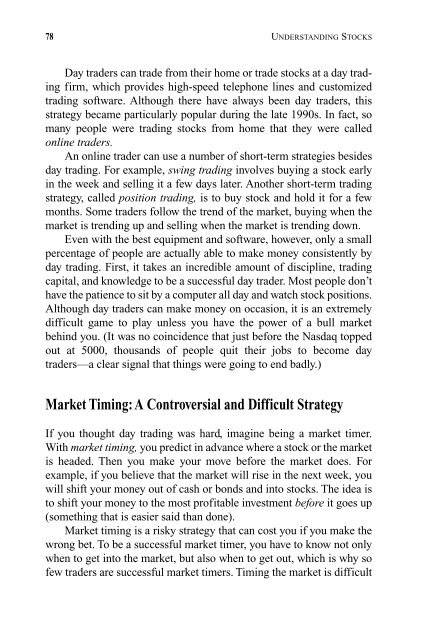Understanding Stocks
Understanding Stocks
Understanding Stocks
You also want an ePaper? Increase the reach of your titles
YUMPU automatically turns print PDFs into web optimized ePapers that Google loves.
78 UNDERSTANDING STOCKS<br />
Day traders can trade from their home or trade stocks at a day trading<br />
firm, which provides high-speed telephone lines and customized<br />
trading software. Although there have always been day traders, this<br />
strategy became particularly popular during the late 1990s. In fact, so<br />
many people were trading stocks from home that they were called<br />
online traders.<br />
An online trader can use a number of short-term strategies besides<br />
day trading. For example, swing trading involves buying a stock early<br />
in the week and selling it a few days later. Another short-term trading<br />
strategy, called position trading, is to buy stock and hold it for a few<br />
months. Some traders follow the trend of the market, buying when the<br />
market is trending up and selling when the market is trending down.<br />
Even with the best equipment and software, however, only a small<br />
percentage of people are actually able to make money consistently by<br />
day trading. First, it takes an incredible amount of discipline, trading<br />
capital, and knowledge to be a successful day trader. Most people don’t<br />
have the patience to sit by a computer all day and watch stock positions.<br />
Although day traders can make money on occasion, it is an extremely<br />
difficult game to play unless you have the power of a bull market<br />
behind you. (It was no coincidence that just before the Nasdaq topped<br />
out at 5000, thousands of people quit their jobs to become day<br />
traders—a clear signal that things were going to end badly.)<br />
Market Timing: A Controversial and Difficult Strategy<br />
If you thought day trading was hard, imagine being a market timer.<br />
With market timing, you predict in advance where a stock or the market<br />
is headed. Then you make your move before the market does. For<br />
example, if you believe that the market will rise in the next week, you<br />
will shift your money out of cash or bonds and into stocks. The idea is<br />
to shift your money to the most profitable investment before it goes up<br />
(something that is easier said than done).<br />
Market timing is a risky strategy that can cost you if you make the<br />
wrong bet. To be a successful market timer, you have to know not only<br />
when to get into the market, but also when to get out, which is why so<br />
few traders are successful market timers. Timing the market is difficult

















